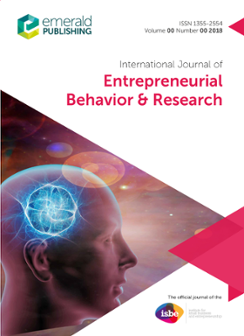社会情感财富(SEW)在家族企业国际化中的作用
IF 4.7
2区 管理学
Q1 BUSINESS
International Journal of Entrepreneurial Behavior & Research
Pub Date : 2022-02-11
DOI:10.1108/ijebr-12-2021-0961
引用次数: 4
摘要
目的家族企业保存和维护社会情感财富(SEW)的愿望使其国际化成为一个复杂的现象。尽管SEW在指导家族企业国际化决策方面具有重要意义,但在基础研究流中的文献仍然不足且不确定。因此,本研究的目的是获得关于SEW的各个维度及其对家族企业国际化程度的影响的初步见解。本研究采用多案例研究的研究设计。利用Berrone等(2012)开发的多维SEW量表,通过对13年(2007-08年至2019-20年)的董事长声明内容分析,计算了印度四家知名家族企业的SEW得分。进一步,本研究通过Somers' D和Kendall-Theil回归两种非参数检验来检验企业国际化程度与企业自主创新能力之间的关系。研究结果揭示了家族企业中各个维度的SEW普遍存在。它们还表明,家族企业中不同的纤维维度的优先级不同。最后,作者观察到,企业自主创新与家族企业国际化之间存在负相关关系,表明企业自主创新阻碍了家族企业国际化。研究的局限性/启示:本研究使读者认识到,家族企业在家族企业国际化中起着重要作用;因此,可能需要对现有的国际商业理论进行一些修改,以解释特殊的家族特征在家族企业国际化决策中的作用。此外,由于SEW阻碍了家族企业的国际化,它给研究人员和家族企业领导人提出了一个问题:家族企业是否需要加强其社会情感关系,以避免做出次优决策?独创性/价值该研究是对Cleary等人(2019)的呼吁的回应,该呼吁利用SEW的内容分析结果来确定其对家族企业外部事件的影响。大多数研究仍然使用单变量测量(例如,家庭所有权的百分比)来捕获SEW。然而,本研究试图通过内容分析来计算家族企业在这些纤维维度上的SEW得分。这有助于谨慎地捕捉SEW对家族企业国际化的影响。本文章由计算机程序翻译,如有差异,请以英文原文为准。
Role of socioemotional wealth (SEW) in the internationalisation of family firms
PurposeFamily firms' desire to preserve and uphold socioemotional wealth (SEW) makes their internationalisation a complex phenomenon. Despite the significance of SEW in guiding family firms' internationalisation decisions, the literature in the underlying research stream is still scant and inconclusive. Thus, the purpose of the study is to gain preliminary insights about various dimensions of SEW and its impact on family firms' degree of internationalisation.Design/methodology/approachThe study employs the multi-case study research design. The multidimensional SEW scale developed by Berrone et al. (2012) is used to calculate the SEW scores for four prominent Indian family businesses through the content analysis of Chairman's Statements for a period of 13 years (2007–08 to 2019–20). Further, the study examines the relationship between SEW and family firms' degree of internationalisation through two non-parametric tests: Somers' D and Kendall-Theil regression.FindingsThe results reveal the prevalence of various dimensions of SEW in family businesses. They also indicate that different FIBER dimensions are prioritised differently in family businesses. Finally, the authors observe that there exists a negative relationship between SEW and internationalisation of family businesses, indicating that SEW hinders the internationalisation of family firms.Research limitations/implicationsThe study lends to the readers, the understanding that SEW plays a significant role in the internationalisation of family firms; thus, some modification might be needed in the existing international business theories in order to explain the role of peculiar family characteristics in the internationalisation decisions of family firms. Further, since SEW hinders the internationalisation of family firms, it raises a question for researchers and family business leaders: Do family firms need to work on their socioemotional ties to avoid making suboptimal decisions?Originality/valueThe study is a response to the call by Cleary et al. (2019) to utilise the results of content analysis of SEW in determining its impact on the family firms' external events. Majority of the studies are still using univariate measures (e.g. percentage of family ownership) to capture SEW. However, this study attempts to calculate the SEW scores of the family firms along these FIBER dimensions through content analysis. This helps in scrupulously capturing the impact of SEW in the internationalisation of family firms.
求助全文
通过发布文献求助,成功后即可免费获取论文全文。
去求助
来源期刊
CiteScore
10.20
自引率
16.40%
发文量
94
期刊介绍:
The International Journal of Entrepreneurial Behavior & Research (IJEBR) has a unique focus on publishing original research related to the human and social dynamics of entrepreneurship, and entrepreneurial management in small and growing organizations. The journal has an international perspective on entrepreneurship and publishes conceptual papers and empirical studies which bring together issues of interest to academic researchers and educators, policy-makers and practitioners worldwide.The editorial team encourages high-quality submissions which advance the study of human and behavioural dimensions of entrepreneurship and smaller organizations. Examples of topics which illustrate the scope of the journal are provided below. Topicality Nascent entrepreneurship and new venture creation Management development and learning in smaller businesses Enterprise and entrepreneurship education, learning and careers Entrepreneurial psychology and cognition Management and transition in smaller, growing and family-owned enterprises Corporate entrepreneurship and venturing Entrepreneurial teams, management and organizations Social, sustainable and informal entrepreneurship National and international policy, historical and cultural studies in entrepreneurship Gender, minority and ethnic entrepreneurship Innovative research methods and theoretical development in entrepreneurship Resourcing and managing innovation in entrepreneurial ventures.

 求助内容:
求助内容: 应助结果提醒方式:
应助结果提醒方式:


